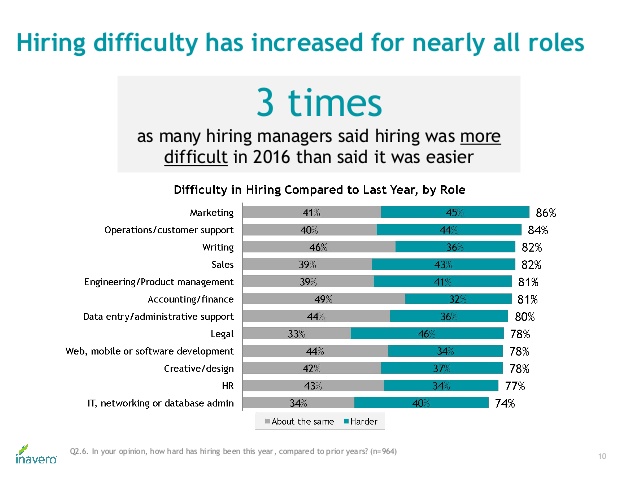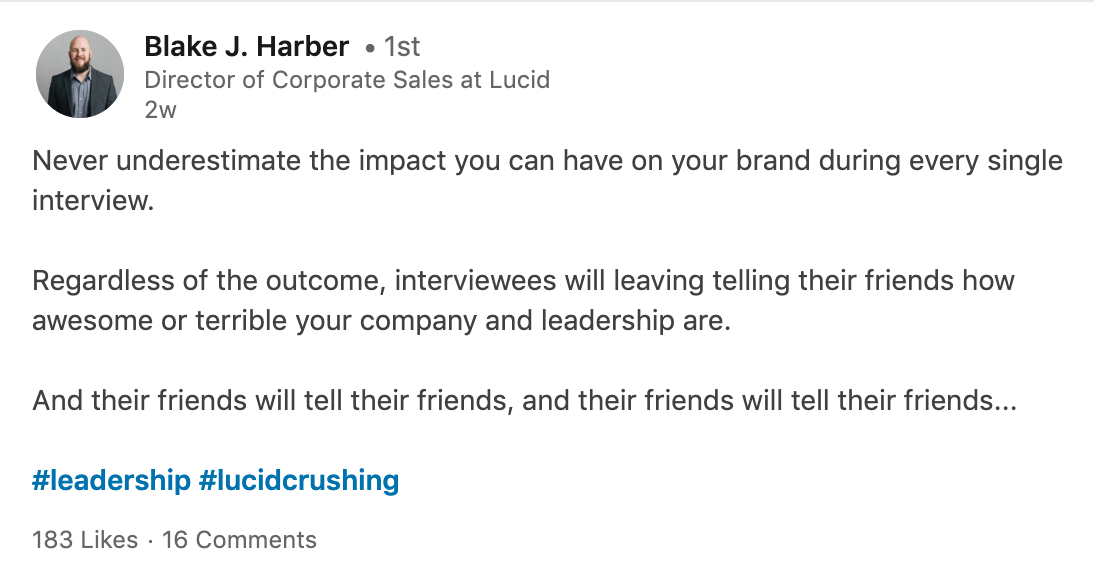
7 misconceptions about sales recruiting that lead to mishires.
I was talking to a partner at a VC the other day who offered up an interesting piece of insight that really hit home for me:
“A lot of our companies don’t know what to expect with recruiting or how to manage an effective process and it comes back to bite them.”
This is pretty common from my experience too.
Much like I’ve seen startups make big hiring mistakes due to mistaken expectations around enterprise sales, recruiting is another one that often has devastating effects.
Here are 7 misconceptions about sales recruiting that can lead to mishires and turnover… and what to expect instead.
Misconception #1: What worked for your network will work for you.
I’m all for tapping into the wealth of knowledge your network has to learn and grow. I do this myself all the time.
However, I do see a lot of people who think building a sales team can be done by simply replicating someone else’s successful approach.
The truth is, there is no “formula” that works for every business! And while something may have worked for them, it doesn’t mean it will for you.
Filter advice from your network through your business needs.
Seek help from your network. But don’t look for a black and white “success formula.” Instead, you need to filter this through what your business needs:
What does success look like and what will the person I hire actually have to do to get there?
That’s what will help you determine who you need to hire, how many people you need to hire, and more!
Additionally, keep in mind that the market will always speak louder. Your board could tell you “this is how much you should pay for a [INSERT ROLE TITLE HERE]”, but the “market value” could be different.
Misconception #2: You can “hack recruiting” by working with several recruiters at once.
Many founders and sales leaders I interact with avoid working exclusively for fear of holding their business back.
But many also understand that they don’t have a great chance of filling their roles with any single recruiting firm under a contingency agreement (statistically, about 18%).
So they often work with multiple at one time to hedge their bets.
However, this fails to account for something incredibly important – not all recruiting processes are created equal.
And different recruiting processes yield different quality candidates.
For example – there is a big difference between a recruiter who spends their time going after passive, employed all-stars with years of proven experience and one using a job board to collect resumes off of candidates who are actively looking.
The most talented people are almost always happily employed. And when you work contingently with multiple recruiters at once, from their perspective, they can’t afford to do much more than:
- Post a job
- Collect the resumes
- Spend 5 minutes with each
- Pass them on for you to deal with
That’s because they know that if you haven’t found someone in the first few weeks the likelihood of getting paid is pretty much gone.
So they take a potshot at it and hope something sticks. If not, they’re gone.
And then you’re left starting over with a new recruiter (which ironically, holds your business back).
How to make sure an exclusive agreement will work for you.
The real differentiator between an exclusive agreement working out and not is in the details… like how proactively they communicate, what they are like during the sales process, what their recruiting process looks like, etc.
These are a few key factors to make sure exclusivity is going to work for you:
-
Proactive communication before you sign a contract – If they’re not responsive or don’t seem to be very organized now, it’s not going to get better once you’re working together.
-
A contract that protects both of you – Does exclusivity lock you into an engagement you can’t get out of? Do they want all of your business or just the roles you want to give them? Look for things like an expiration date on the contract so you can both step away if it’s not working.
-
A recruiting process that emphasizes collaboration – Working from a ‘black box’ is the kiss of death for all parties involved. So look for things in their process like weekly calls to discuss progress and lot of discovery up front.
If a recruiter embodies this approach, it’s a good sign they’re going to be a strong partner who has your back throughout the search.
Misconception #3: Low-balling someone you want to hire to get the “best price” is a smart idea.
Quite the opposite, especially in today’s market.
Sales is one of the hardest industries to hire in right now according to a recent study (below) and unemployment is at a 49-year record low.
Most candidates with half a shred of talent are considering multiple offers or opportunities at the same time these days!

Furthermore, low-balling becomes even more dangerous if the candidate is passive (i.e. already employed).
Passive candidates have an uncanny ability to turn active the moment you engage with them. So when you play games with them, it just turns them off and gets them looking elsewhere.
Put yourself in their shoes… how eager would you be to work for a new business if you invested all that time and ended up getting low-balled?
Treat talented salespeople like rare gems.
We’ve had clients offer candidates more than the comp they were looking for to make a move just because they didn’t want to lose them.
I’m not saying you need to do this. But I am saying that this is the mindset to put on… these days in particular.
A-players care about how you recruit them just as much as what you’re recruiting them for. And low-balling them sends them all the wrong signals about what it’s really going to be like working for you.
Misconception #4: Working a recruiter down to 15% will get you A-players.
I’m not suggesting you should pay more than you need to.
But what most businesses don’t understand is that most recruiters willing to work for 15% aren’t giving you their best people… again, especially in this market.
Think about it… if you have an ace in your hand, why play it when you’re not going to get anything for it?
It simply doesn’t make business sense to you use your best candidates on a low paying opportunity.
So again, they post a job, throw some candidates at you, and hope something sticks.
If nothing does, they sneak out the side door leaving you and any candidates you were in touch with wondering what happened.
Quality recruiting is worth paying for.
Case in point, a client of ours nearly 3x’d their forecasted sales target last year thanks to the team of all-stars they built (individual quota attainment averaged out at 120%).
Compare that to the 150%-200% that Deloitte estimates that turnover costs you and the amount they paid us was a drop in the bucket.
Misconception #5: Seeing candidates just days after you start the search is a good thing.
The problem with speed is not that it is inherently bad.
It’s that most who are able to deliver a crop of candidates just days after you engage with them aren’t being very intentional about what they’re doing.
They can’t be – there just isn’t time to do things like:
- Get to know candidates and vet them thoroughly
- Put thought into how they reach out to people
- Engage true top performers (who are almost always employed)
And not only does this typically mean you’re getting lower quality candidates, this rush approach also affects how you look in the talent marketplace.
And that is really important in the sales world because people talk:

You can’t put a price on your brand in the talent marketplace!
When speed is ok…
Again, the real problem here is speed at the expense of intentionality and quality in the recruiting process is… not the speed itself.
That’s why if you know a sales recruiter has the process and can explain how they found a candidate so quickly (i.e. say they know them through their network and that it would be a great fit), seeing candidates quickly could be a great thing.
Just make sure you understand the back story and the process they’re using to source the people they bring your way before you consider speed.
Misconception #6: Working with a generalist recruiter is a good idea.
I’m confident that most of us have been approached by a recruiter who had no idea what they were talking about at least once.
How did that make you feel? What did you think about the company as a result?
As I mentioned above, your brand in the talent marketplace is priceless. It can make hiring talented people easier… or quite the opposite.
And when you engage with a recruiter who is a generalist and doesn’t speak the language of the people you’re trying to reach, it doesn’t reflect well on you with candidates.
How to know if they’re a trustworthy specialist.
There’s really two ways in my mind to assess this:
-
Do they have a strong track record of doing the job themselves before getting into recruiting?
-
Have they been in one industry for a long time with the track record to back it up?
For instance, you don’t want to hire a “specialist” who has only been recruiting in the sales world for 2 years or a firm who only works with the IBMs of the world when you’re a startup. That’s not going to help you.
Look for indications that they have deep knowledge of the world they recruit for!
Misconception #7: A recruiter who has a local office means they’re more dialed in.
I’m not saying that they’re not. I’m saying that just because they’re local doesn’t mean they can better deliver.
Think about it in terms of the talent you’re hiring… just because a salesperson is local doesn’t mean they have the skills you need to be successful.
Same goes for your recruiter – their location doesn’t tell you much about their ability to bring you the best people.
The best firm for the job may not be in your city at all!
Find the best recruiter for the job… wherever they are.
The more important things to consider when choosing a sales recruiting partner is their specialty and their process.
If their process isn’t anything more than posting jobs and collecting resumes or if they don’t take the time to get to know your business, it doesn’t matter how “dialed” they really are.
They’re still not going to be able to bring you the best people for your business.
Same goes for generalists who are local… how will they be able to represent your brand intelligently in the talent marketplace if they don’t speak the language of sales?
Questions about sales recruiting?
Our hotline is always on and we’re happy to talk shop if getting your sales hires right is top of mind.
Sales advice that works, in your inbox.
No spam, no pitches. Just real insights like these that have helped us win at sales and recruiting over the last 20 years via email each week.
